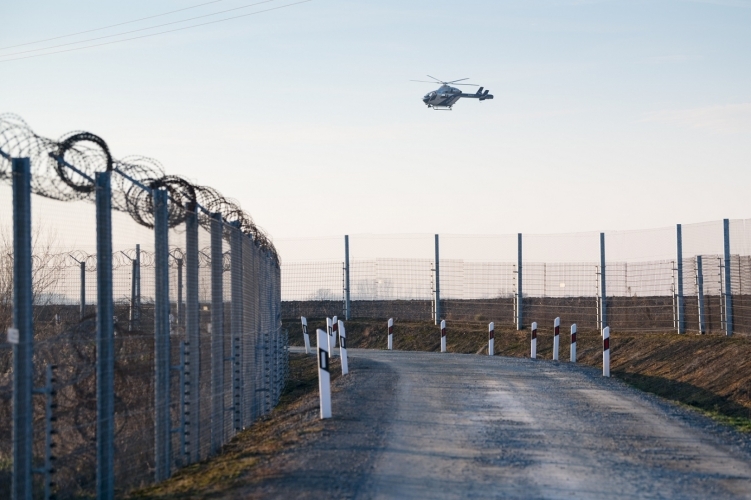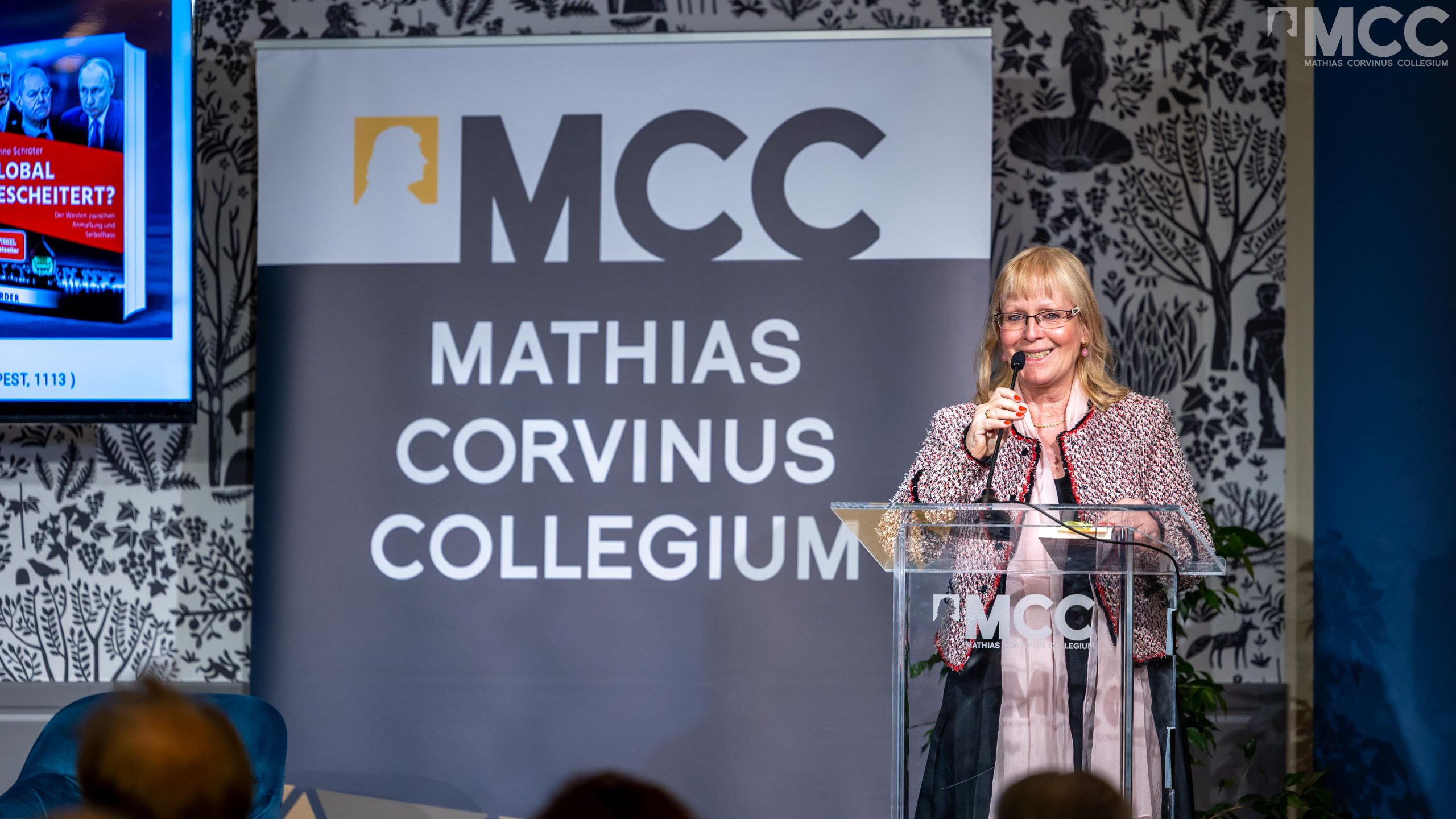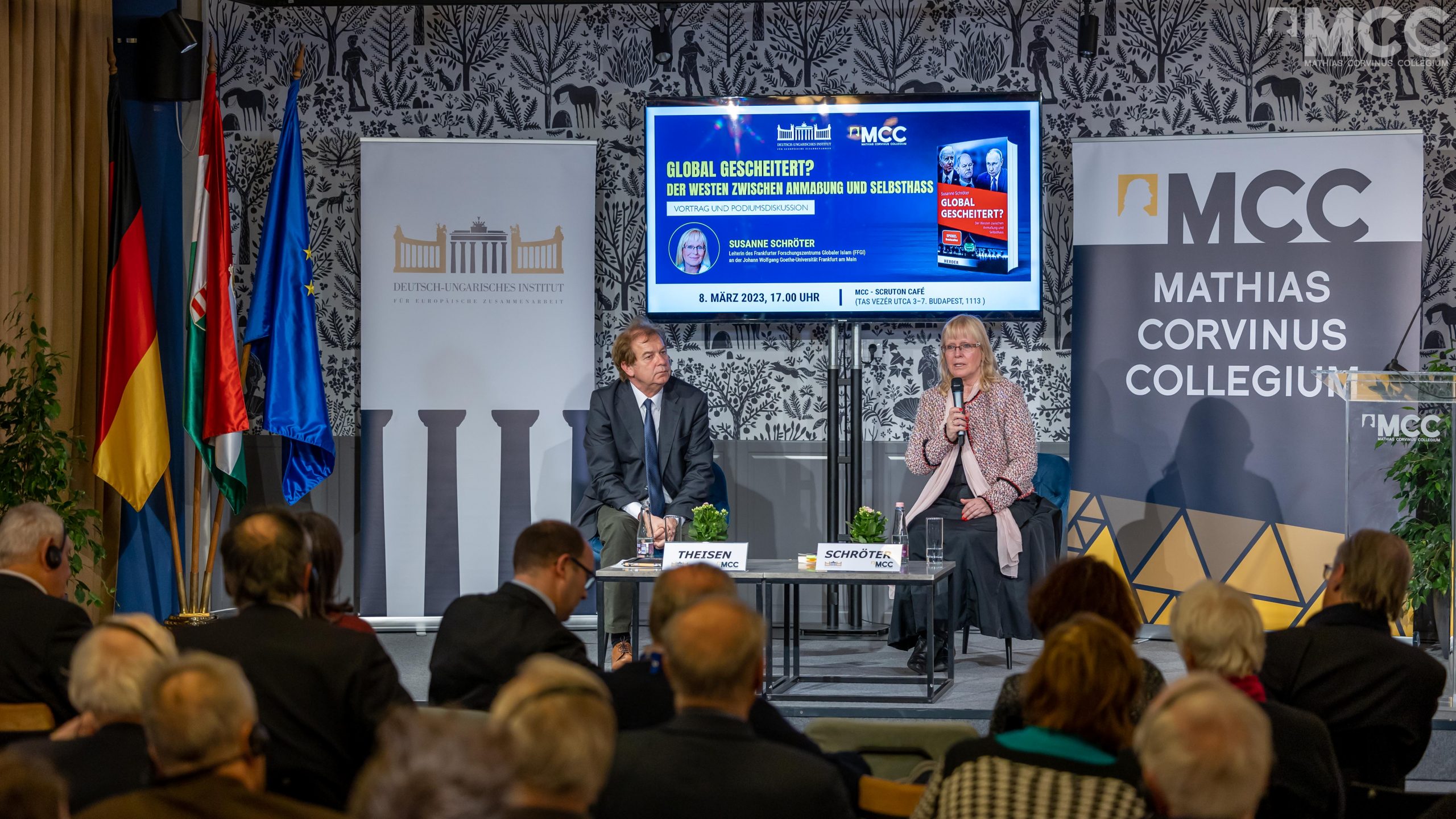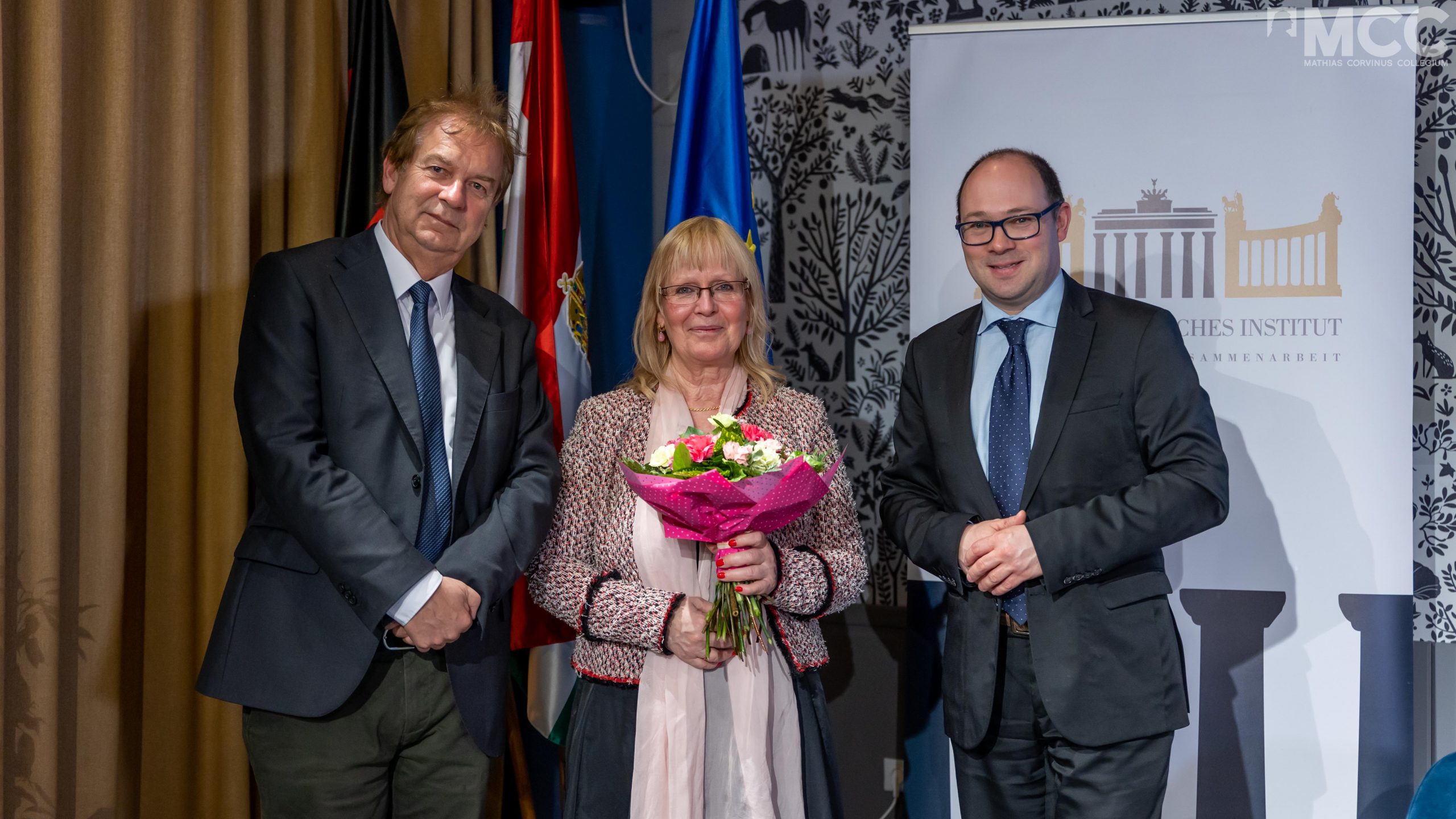
The Hungarian position on migration eight years ago proved to be correct, according to Balázs Hidvéghi.Continue reading

The Mathias Corvinus Collegium (MCC) hosted a book launch on March 8 of the book Global gescheitert? Der Westen zwischen Anmaßung und Selbsthass (Global failure? The West between Presumption and Self-Hatred) written by Prof. Dr. Susanne Schröter, director of the Frankfurt Research Center on Global Islam. We talked to the expert in ethnology and Islamic studies about the impact of mass immigration and the contrast with Hungary.
Hungary is often criticized for linking the spread of religious extremism in Europe with mass immigration. Why do you think this connection is a taboo subject in today’s political discourse in Europe?
It is simply empirically undeniable that religious extremism has something to do with mass immigration. If you look at it, and not just since 2015, but even before, the attack on the World Trade Center in New York alone was largely planned by Arab students in Hamburg. They radicalized there in a mosque, which had been a hotspot for jihadists until 2010. For nine years longer.
People simply ignored this issue the whole time and they still do. There was only one short phase where people became a little bit attentive, namely when the so-called Islamic State had the upper hand in Syria and Iraq and all the foreign jihadists/foreign fighters were recruited. As attacks have been carried out in Germany, Paris, Belgium, and in Spain, suddenly people began to understand that there really was a problem, but that didn’t penetrate to the point where they questioned migration, and today they don’t do that either. I am really amazed. We have such a sharp increase even in smaller attacks or knife attacks on women, especially teachers, schoolgirls.
Even if we know that these are Muslim migrants and can track when they came into the country, the matter is still not being treated, the press tries to get it out of the media very quickly.
Politics does not pick it up, because they are afraid it is only useful to right-wing extremists and because they do not pick it up, we have of course on the right a topic that can be discussed. In all European countries we have right-wing parties that deal with migration, and therefore the rest does not want to have anything to do with it or sweeps all problems with migration, especially with the migration of Muslims, under the carpet.
The problem is, of course, that Islamism will not simply dissolve, nor will violence and misogyny. We can see that and if it is not processed, not dealt with, then it will increase more and more and we have unregulated migration – that’s what we have, that’s what we have especially in Germany, because most of them want to go to Germany – and in Germany there is no reasonable policy, they always say “we process the applications when someone applies for asylum and whoever has no right to be here has to leave again.”
In fact, the offices are no longer able to process the applications in a timely manner, many people do not even apply, but simply disappear, and those who are rejected are not deported. In Germany alone, we have over 300,000 people who should be deported. But that does not happen. It doesn’t happen because there are no agreements with the home countries or because the people suddenly can’t be found anymore or because some NGO lawyer says that the person is sick and can’t be deported. By now, our municipalities are completely overburdened, can’t keep up at all, we don’t even have shelters anymore. There have now been cases where residents have had to move out so that refugees could move in. We have also had the case that a retirement home was closed down because more money can be made with refugees. There is now a great deal of anger among the population.
That was a failed migration policy. It is always said that we are looking for skilled workers, but we get far too few skilled workers. How should we get skilled workers if we only accept people who, for the most part, are not even literate? Everybody knows that this is the wrong group and then humanitarian things are mixed with economic aspects.
Hungary, however, closed the border, and everybody criticized Hungary as inhuman, xenophobic.
But now, over a long period of time – Germany is now also reaching its limits – many countries have completely changed their policy from being very welcoming to completely closing their borders. In Germany, too, more and more people are talking about how to stop unregulated migration and come to the conclusion that the borders have to be closed. Hungary has already done this, but nobody wants to say that this was the right way. There are many things that play into this big problem, such as that they overestimated themselves and thought that everything would work out, but it doesn’t work out at all with Islamism.

Prof Dr Susanne Schröter (r.) and Prof Dr Heinz Theisen (l.) (Photo: Dániel Holla/MCC)
Then, of course, there is the contradiction between left-wing governments or left-wing political actors who are fundamentally opposed to the nation-state or are more in favor of a world without borders. But this idea is not real, not practicable. If you ask young people in Tunisia, Morocco, or even many sub-Saharan African countries, half of them want to go to Europe and the vast majority to Germany. Everyone knows that this is not possible. As long as you let all the people in somehow and then as long as Angela Merkel says “we can do it,” that’s a pull factor. The young people see that they can get money in Germany without working. But people don’t yet understand that it is finite.
There are two concepts, on the one hand the concept of the nation, which Hungary strongly represents, i.e. the nation state of Hungary determines what happens in the country and not Brussels, and on the other hand there are those according to whom the nation state has no right to do so, that such things are decided at the EU level.
I believe that in the meantime – without it being expressed as explicitly as by Viktor Orbán – many European heads of state are acting in the same way and saying that we are not accepting any more, we are not communicating this, but we are simply not doing it. In the end, I don’t see that these left-wing representatives will prevail. At the moment, it is a struggle at the European level, and Orbán makes it very easy for his opponents; he is very direct, and is not always very diplomatic in his choice of words. But many others do the same.
Does this mean that there is a chance that the post-liberal model of democracy outlined by Hungarian national conservatism will spread in the German cultural sphere, as is happening in America, for example?
I wouldn’t call it post-liberal or illiberal. His criticism is rather directed against the left. I don’t think it’s liberal to force other states to align their migration policies with a headquarters in Brussels. Liberal would be for the Hungarians to decide for themselves. Just as our rather left-leaning government in Germany dictates how we deal with LGBT people or which pronouns we have to use. The majority of the population rejects it, but the government wants to enforce it with laws and regulations. That’s anything but liberal, that’s authoritarian. My criticism would rather be that this policy, which is always trying to impose itself on others – even with financial coercive measures at the EU level or with laws at the national level – is not liberal. It’s more reminiscent of the communists who were in power in the Soviet Union or in China, namely people who rely on a strong state that enforces everything against the population. I actually find that illiberal.
You mentioned earlier that many problems are swept under the carpet. You are also dealing with the issue of integration. There are more and more signs that the political elite in the West has abandoned these efforts in practice. Why could this happen in this way? What are the consequences if the integration process stalls?
The consequences are that we get parallel societies that develop as counter-societies and have their own rules and values and are always confrontational. We see this not only in examples like the New Year’s Eve riots, we see it above all in schools. In schools there is now religious bullying by Muslim students, certain lessons can no longer be held because Islamic parents say they are against the Quran, and certain topics can no longer be addressed because it could result in violence. We see that the education system is suffering. Failed integration also leads to education systems being eroded and no one wants to teach anymore. I know many teachers who no longer want to teach at all. We therefore have a shortage of teachers. People no longer want to become teachers because these are not conditions in which you can guarantee education. We have schools where 80 percent no longer speak German and the remaining 20 percent are trying to get away from there because they won’t get an education there.
Integration can only work if it takes place in a controlled manner and if you know exactly which people you are bringing in. That’s how immigration societies do it. All immigration societies choose who they invite, have criteria, and look after people so that they can arrive. But you don’t do that when you bring in people from Afghanistan or elsewhere in an uncontrolled manner and you don’t even know who they are and you don’t have people to take care of them properly. The result is parallel societies and chaos, and also that women are increasingly unsafe in public spaces. That started on New Year’s Eve and hasn’t stopped until today. When I look at New Year’s Eve pictures now, there are no women in the streets anymore. I know many women who used to party in the street but no longer do. They also no longer take public transportation in the evening.

Prof. Dr. Heinz Theisen (l.), Prof. Dr. Susanne Schröter, Dr. Bence Bauer (r.) (Photo: Dániel Holla/MCC)
You talked about religious bullying at school. In Hungary, the historical religious communities have spontaneously devoted themselves to the cultivation of national values. In contrast, German churches, among others, are the biggest financial supporters of immigration and openly welcome the Islamization of the country. To an outsider, this is all but inexplicable. How do you explain this phenomenon?
There are two things. One is a religious justification: Jesus was a refugee, so we have to take care of the refugees. But the Protestant Church in particular is counting heavily on this to gain members. They hope to attract young people by supporting sea rescue, supporting refugees, even granting church asylum. They hope to reach circles that have long been distant from the church. But this does not work; the churches are permanently losing members. They are neglecting spirituality and pastoral care, their core business. If the church now turns into a refugee NGO or, as is always said for the Protestant church, into a pre-organization of the Green Party, then it has already given up its actual task.
The churches are also working quite closely with Muslims, because ultimately they want religious organizations to somehow survive in this secularization process. That, in turn, makes them not at all credible to others, which is why there is also a lot of criticism of the churches.
Photos: courtesy of MCC